Tech4Change: TechChange
In this feature Tech4Change interview, Singlebrook talks with TechChange, an online learning company recently published in the Stanford Social Innovation Review (SSIR).
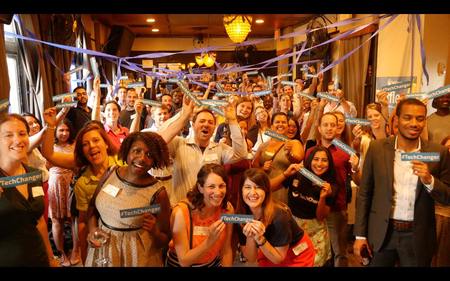 TechChange’s newest initiative is a diploma program offering technical training in course tracks geared toward people in the international development sector. TechChange has provided online trainings for over 10,000 alumni across more than 170 countries, both in conjunction with universities and as an alternative to traditional grad school.
TechChange’s newest initiative is a diploma program offering technical training in course tracks geared toward people in the international development sector. TechChange has provided online trainings for over 10,000 alumni across more than 170 countries, both in conjunction with universities and as an alternative to traditional grad school.
Singlebrook: In what ways do you collaborate with other organizations and universities?
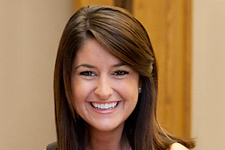 Jennie Armstrong, TechChange Director of Marketing: We work with organizations like UNICEF, the U.S. State Department, World Bank, and other large NGOs to develop online trainings for their teams working on the ground all over the world. We also have four-week open enrollment courses on a range of topics around the role of technology for social good, where we bring leading, international guest experts to speak to our students on our social learning-based platform. We also work with universities, like Notre Dame and University of North Carolina Chapel Hill, to develop trainings and programs unique to their needs. We have had many university students take our courses to supplement their academic education. This is all done on our proprietary platform, using our in-house animators, instructional designers, technologists and educators.
Jennie Armstrong, TechChange Director of Marketing: We work with organizations like UNICEF, the U.S. State Department, World Bank, and other large NGOs to develop online trainings for their teams working on the ground all over the world. We also have four-week open enrollment courses on a range of topics around the role of technology for social good, where we bring leading, international guest experts to speak to our students on our social learning-based platform. We also work with universities, like Notre Dame and University of North Carolina Chapel Hill, to develop trainings and programs unique to their needs. We have had many university students take our courses to supplement their academic education. This is all done on our proprietary platform, using our in-house animators, instructional designers, technologists and educators.
 Samita Thapa, TechChange Global Communications and Engagement Officer: Along with online courses, TechChange also offers our platform for any organization or university’s online learning needs. We have teamed up with Ashoka Changemakers, one of the leading organizations in the field of social enterprise, to create a four-week online certificate course in social intrapreneurship. The Asian & Pacific Islander (API) Wellness Center is also delivering online HIV education to clinical and non-clinical professionals in California through our platform. We also created and facilitated an online course for MAMA, or Mobile Alliance for Maternal Action, who launched a global learning program with TechChange.
Samita Thapa, TechChange Global Communications and Engagement Officer: Along with online courses, TechChange also offers our platform for any organization or university’s online learning needs. We have teamed up with Ashoka Changemakers, one of the leading organizations in the field of social enterprise, to create a four-week online certificate course in social intrapreneurship. The Asian & Pacific Islander (API) Wellness Center is also delivering online HIV education to clinical and non-clinical professionals in California through our platform. We also created and facilitated an online course for MAMA, or Mobile Alliance for Maternal Action, who launched a global learning program with TechChange.
We’ve had groups from organizations like Mercy Corps and UNICEF enroll groups of 20 people for courses like Technology for Monitoring and Evaluation and Technology for Data Visualization. After taking a course himself, a former professor from the Public Health Institute at Notre Dame enrolled his students in our “Mobile Phones for Public Health” course as a requirement for his course. Universities and organizations have collaborated with us to enhance the learning experience of their students and teams regardless of where they may be located.
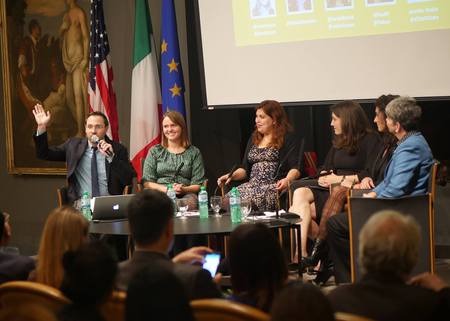 JA: It’s our goal to increase our collaboration with universities. With our diploma program, it may seem like we’re going head-to-head because of how much we address the increasing cost of tuition for higher education, but we want to work with universities and other learning institutions to ensure professionals have all of the most relevant, timely tech skills they need.
JA: It’s our goal to increase our collaboration with universities. With our diploma program, it may seem like we’re going head-to-head because of how much we address the increasing cost of tuition for higher education, but we want to work with universities and other learning institutions to ensure professionals have all of the most relevant, timely tech skills they need.
A top university is currently charging $60K for a two-year online degree in International Development. We think the International Development market needs to be more inclusive. It shouldn’t be about whether or not you have enough money to get a grad degree.
We want to give people the hard skills that they need to really make an impact. Through following in the incredible footsteps of General Assembly, we are taking someone with passion, teaching them everything they need to know (including how to use leading tech tools in this field), and funneling them to great organizations where they can make an impact, all within a few months.
In general, we want to collaborate with anyone that understands the need for embracing technology and online learning in a cost-effective way.
Singlebrook: Can you tell me more about TechChange’s technology and the tools that have been most useful to your organization?
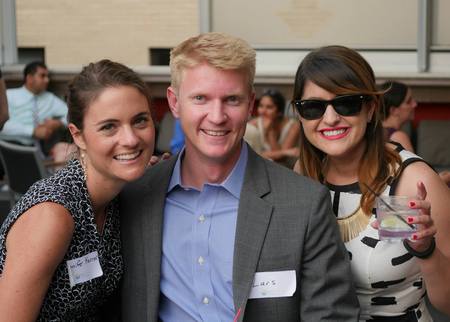 JA: On one hand, we are entering the SaaS (software as a service) market. We didn’t really have the intention of platform licensing when we started out five years ago, but we’ve seen a huge need from our partners, especially those who were interested in increasing the number of people they can impact through online versus in-person training and want to do it on our platform.
JA: On one hand, we are entering the SaaS (software as a service) market. We didn’t really have the intention of platform licensing when we started out five years ago, but we’ve seen a huge need from our partners, especially those who were interested in increasing the number of people they can impact through online versus in-person training and want to do it on our platform.
What makes the TechChange platform so unique for its users is that it encourages activity between participants. Because we have students from all over the world, any time you log on, you can find someone else who is online. You can have incredible conversations about real-life challenges you’re facing. The majority of our students are working professionals, and they’re coming into this course while working on major projects around the world. This gives everyone a chance to talk about similar and unique challenges they’re facing and share ideas. That peer-to-peer learning is really powerful. This is especially true for university students. When we had a group from Notre Dame in our mHealth course, they were able to talk to public health professionals in the course and consult them as they prepared for their field placements.
After five years in this industry, we’ve had so many people who were looking for a more-substantive education to tie everything together. Through the TechChange diploma program, we have two options. One is a working professional experience where you take three core “Tech for… “ classes. Our star product is rolling out in January 2016 and, for less than $5K, it includes the working professional experience, as well as portfolio development and the chance to work with an NGO on an extended capstone project. The capstone partner also acts as a potential for job placement once the program ends. We’re also doing in-person workshops, a five day orientation in D.C., and a conference. At the end of the program, you’re going to have a portfolio, multiple projects you’ve worked on, and we’ll be funneling you to interviews to get you placed based on your interests.
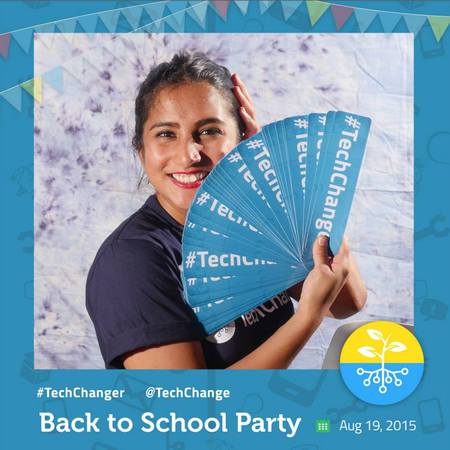 ST: Because of the interactions our students have throughout the course, we also want to take that beyond the courses and have an alumni platform where you can meet people who have taken any of the TechChange courses. We’ll be facilitating that engagement and giving them opportunities through the platform’s job search function. Specifically for our alumni, because they’ve been our biggest cheerleaders, we want to show them appreciation by creating a more robust alumni program for them.
ST: Because of the interactions our students have throughout the course, we also want to take that beyond the courses and have an alumni platform where you can meet people who have taken any of the TechChange courses. We’ll be facilitating that engagement and giving them opportunities through the platform’s job search function. Specifically for our alumni, because they’ve been our biggest cheerleaders, we want to show them appreciation by creating a more robust alumni program for them.
Singlebrook: What advice do you have for marketers and other Higher Education professionals?
JA: Every student is different, and the nature of this world is that it’s not static. Every time we run a course, every iteration is different. No two classes of the same topic have looked the same. Because of the time that’s passed, whether it’s two months or six months, things in that field have changed. New technologies are coming out and new thought leaders emerge. Understanding your students’ needs, understanding the industry, and always tailoring your content are so important.
I think there’s a way for Higher Ed professionals to think innovatively when it comes to how they develop and promote their courses. Even if you’re working at a large institution, find ways to integrate new technologies and ideas into your learning and into your ways of teaching -- and of course, don’t shy away from technology.
***
Singlebrook’s T4C campaign spotlights entrepreneurs and organizations that are using technology in unique ways to scale their ideas and create a massive impact. We are also creating our own high impact T4C projects. Check them out at: singlebrook.com/t4c. Share your stories of T4C or other inspirational resources and tips on Twitter (@Singlebrook) using #Tech4Change and on the T4C Facebook group, or contact us to be spotlighted in an upcoming feature interview or blog article!